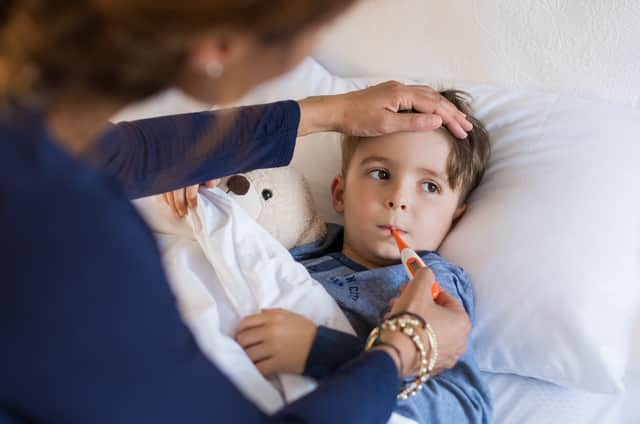If your child has any of these illnesses you should keep them off school


It can be tricky deciding whether or not to keep your child off school, nursery or playgroup when they’re unwell.
To help those who are unsure, the NHS has released guidance for parents, schools and nurseries that say when children should be kept off school and when they shouldn't.
Advertisement
Advertisement
If you do keep your child at home, it's important to phone the school or nursery on the first day. Let them know that they won't be in and give them the reason. If your child is well enough to go to school but has an infection that could be passed on, such as a cold sore or head lice, let their teacher know.
When it’s fine to go to school
Cold sores
There's no need to keep your child off school if they have a cold sore - a tiny blister that develops on the lips or around the mouth.
Urge them not to touch the blister or kiss anyone while they have the cold sore, or to share things like cups and towels.
Conjunctivitis
Again, you don't need to keep your child away from school if they have conjunctivitis, an eye condition caused by infection or allergies.
Advertisement
Advertisement
The NHS recommends you get advice from your pharmacist and encourage your child not to rub their eyes and to wash their hands regularly.
Coughs and colds
However, if they have a fever, keep them off school until the fever goes.
Hand, foot and mouth disease
Hand, foot and mouth disease is particularly common in kids and causes ulcers, or sores, inside or around the mouth, and a rash or blisters on the hands, feet, legs or buttocks.
Advertisement
Advertisement
While it's not pleasant, it's not serious and there's no need to keep children off school if they have it.
Head lice and nits
There's no need to keep your child off school if they have head lice.
See how to get rid of them here.
Sore throat
You're okay to send your child to school if they have a sore throat.
However, if they also have a fever you should keep them at home until it goes away.
Threadworms
Advertisement
Advertisement
You don't need to keep your child off school if they have threadworms.
Speak to your pharmacist, who can recommend a treatment.
Ringworm
Ringworm is a common fungal infection in kids and normally causes a red or silver rash. The NHS says to see your pharmacist unless it's on their scalp, in which case you should see the GP.
It's fine for your child to go to school once they have started treatment.
When they shouldn’t go to school
Chickenpox
If your child has chickenpox you should keep them off school until all the spots have crusted over.
Advertisement
Advertisement
This is usually about five days after the spots first appeared.
Diarrhoea or vomiting
Children with diarrhoea or vomiting should stay away from school for two days after their symptoms have gone.
Ear infection
If your child has an ear infection and a fever or severe earache, keep them off school until they're feeling better or their fever goes away.
Fever
If your child has a fever, keep them off school until the fever goes away.
Scarlet fever
Advertisement
Advertisement
If your child has scarlet fever, they'll need treatment with antibiotics from the GP. Otherwise they'll be infectious for two to three weeks.
Your child can go back to school 24 hours after starting antibiotics.
Impetigo
Impetigo is a skin infection that's very contagious so it's best to keep your child off school if they have it.
Keep them off school until all the sores have crusted over and healed, or for 48 hours after they start antibiotic treatment.